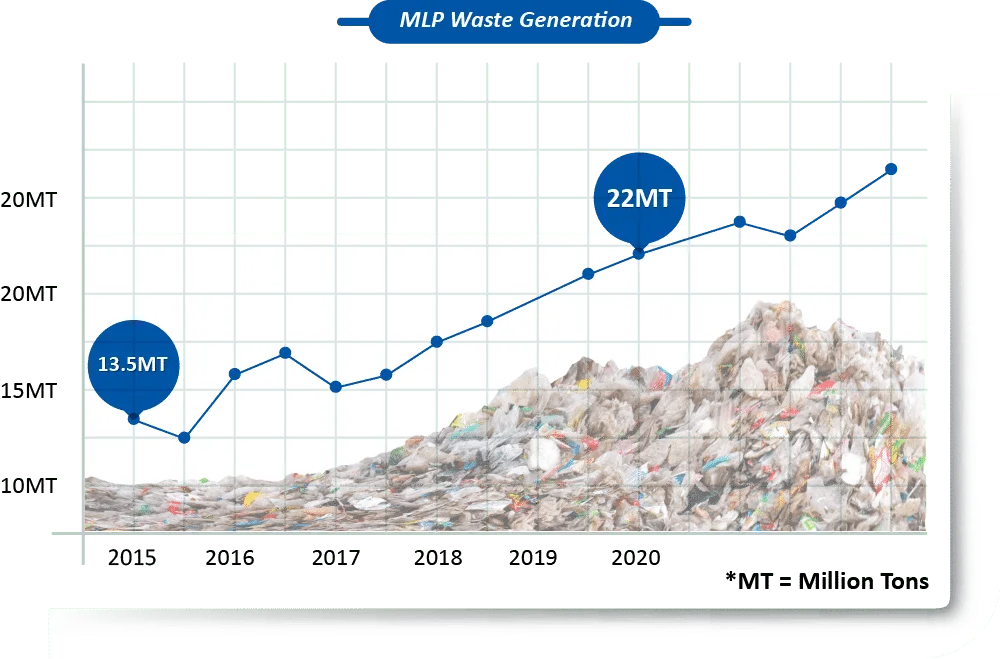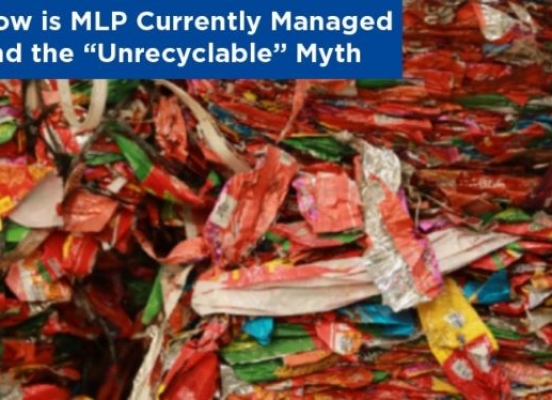How is MLP Currently Managed and the “Unrecyclable” Myth
What is MLP?
MLP stands for Multi-Layered Plastic. It is a type of plastic most commonly used for packaging of food items such as chips, biscuits, chocolates and other snacks. Mostly, MLP packets have two sheets of plastic enclosing a layer of aluminium, but technically MLP can be any material that has at least one layer of plastic.
These multiple layers prevent food contamination and help in transport and storage. Hence, this is the best way in which packaged food can reach people, say food majors. But waste collectors and rag pickers typically don’t collect this waste, as it is extremely low value (INR 2-4/Kg compared to INR 25-30/Kg for PET, for example) and is therefore doomed to littering our streets, dumps and sewage canals.
How Much MLP Do We Generate?

(June 2019, ET article) According to a Federation of Indian Chambers of Commerce and Industry study, it is estimated that the plastic producing industry in India is estimated to grow to 22 million tonnes (MT) a year by 2020 from 13.4 MT in 2015 and nearly half of this is single-use plastic (majorly MLP).
(Dec 2019, HT article) Maharashtra Pollution Control Board data states that, of 23,600 metric ton (MT) of MLP waste accumulated in the state in 2019, 12,500MT has been collected by PROs and sent to cement industries or disposed through a process called pyrolysis.
The remaining waste has either ended up burnt, at landfills or littering land and natural water bodies.
How is MLP Currently Managed and the “Unrecyclable” Myth
It is widely believed by the government, manufacturers, brands and consumers that the large amount of MLP and MLP waste being generated is “non-recyclable” due to its low value.
Due to this “myth”, MLP waste is either:
1) taken to cement kilns for co-processing or 2) mixed with bitumen for road construction, or it is also disposed of using 3) WTE (Waste to Energy) or 4) Pyrolysis.
However, none of these methods are ideal or sustainable as they are either extremely polluting or cause economic loss of the material (i.e. MLP).
It is untrue that MLP waste cannot be recycled. There is a fifth and ideal method- Waste to Granules (i.e. Recycling)
Recycling of MLP
The Shakti Plastic Industries has invested in the technology to recycle MLP and has the capacity to convert MLP waste into granules which are fit to be used for making a variety products ranging from chairs, stools, benches, pallets, flower pots to much more!
In terms of benefit to the manufacturer, producers and end consumers, recycled MLP pellets are far cheaper than those made from virgin plastic pellets apart from being sustainable, contributing to a circular economy and ensuring that the large amount of untreated MLP plastic waste does not pollute our shared environment.
Way Forward for Encouraging MLP Waste Recycling
In order to promote the recycling of MLP on a large scale, the industry needs the following:
- Strict legislation
- Appropriate Technology
- Government support and subsidies
- Zero custom duty on import of MLP recycling machinery and technology
- Compulsory economic support through EPR by the brands/ manufacturers/ producers/ importers of products using MLP packaging.
- Decentralised waste systems to ensure greatest collection and transportation of MLP waste from areas of waste generation to the recyclers.
Challenges in Recycling MLP Waste
- Highly power intensive industry
- Processes involve large water consumption and requirement of an ETP plant
- Large investments
- Unavailability of appropriate technology on a large scale
- Collection of MLP waste from areas of generation including rural and hard-to-reach areas
- Quality control and standardisation of MLP waste and resulting recycled plastic pellet
Benefits of MLP Recycling
- Sustainable solution for managing the growing MLP waste
- Manages a highly polluting type of plastic waste that is widely littered and left uncollected
- Contributes to a Circular Economy
- Economically beneficial
- Resource recovery
- Employment and Job Creation
- Incentivization for and upliftment of informal workers through the chain
- Supports formalisation, organisation, structuring and growth for all the stakeholders in the recycling chain in India (waste workers and rag-pickers, aggregators, recyclers, PROs, etc.)
To know more, please check Shakti Plastic Industries.

